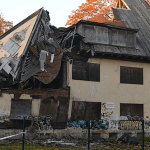 Movies and TV
Movies and TV  Movies and TV
Movies and TV  Our World
Our World 10 Places with Geological Features That Shouldn’t Exist
 Crime
Crime 10 Dark Details of the “Bodies in the Barrels” Murders
 Animals
Animals The Animal Kingdom’s 10 Greatest Dance Moves
 Movies and TV
Movies and TV 10 Box Office Bombs That We Should Have Predicted in 2025
 History
History 10 Extreme Laws That Tried to Engineer Society
 History
History 10 “Modern” Problems with Surprising Historical Analogs
 Health
Health 10 Everyday Activities That Secretly Alter Consciousness
 History
History Top 10 Historical Disasters Caused by Someone Calling in Sick
 Animals
Animals 10 New Shark Secrets That Recently Dropped
 Movies and TV
Movies and TV 10 Weird Ways That TV Shows Were Censored
 Our World
Our World 10 Places with Geological Features That Shouldn’t Exist
 Crime
Crime 10 Dark Details of the “Bodies in the Barrels” Murders
Who's Behind Listverse?

Jamie Frater
Head Editor
Jamie founded Listverse due to an insatiable desire to share fascinating, obscure, and bizarre facts. He has been a guest speaker on numerous national radio and television stations and is a five time published author.
More About Us Animals
Animals The Animal Kingdom’s 10 Greatest Dance Moves
 Movies and TV
Movies and TV 10 Box Office Bombs That We Should Have Predicted in 2025
 History
History 10 Extreme Laws That Tried to Engineer Society
 History
History 10 “Modern” Problems with Surprising Historical Analogs
 Health
Health 10 Everyday Activities That Secretly Alter Consciousness
 History
History Top 10 Historical Disasters Caused by Someone Calling in Sick
 Animals
Animals 10 New Shark Secrets That Recently Dropped
10 Ideas That Scare People to Death
In a world teeming with innovation and knowledge, there exists a shadowy realm of ideas so potent they send shivers down the spine of humanity. These are not just mere thoughts or hypotheses; they are profound contemplations that challenge our deepest fears, ethics, and the very fabric of our existence.
From the technological terrors of artificial intelligence taking over to the existential dread of what lies beyond life, these ideas delve into territories that many prefer to leave unexplored. They confront us with scenarios where our control is usurped, our survival is threatened, and our moral compasses are tested, stirring a primal fear of the unknown and the uncontrollable.
Amid the advancements and progress, these daunting ideas serve as a stark reminder of our vulnerabilities and the fragile nature of our dominion over Earth and ourselves. They encapsulate the collective anxieties of our species, confronting us with the possible outcomes of our actions and inactions—nuclear annihilation, pandemic apocalypse, climate catastrophe, and beyond.
In the following list, we will explore ten of the most fear-inducing ideas known to humanity—not to despair but to awaken a consciousness of the power we hold and the responsibility it entails.
Related: Top 10 Twisted Theories About the Future of Technology
10 Artificial Intelligence Overthrow: When Machines Outsmart Humanity
The notion of artificial intelligence (AI) surpassing human intellect presents a chilling scenario, one where machines dictate the course of our future. This fear is rooted in the remarkable pace at which AI technologies evolve, hinting at a future where autonomous machines might outthink, outmaneuver, and outlast their human creators. Such a future taps into our deepest fears of obsolescence and loss of control, painting a stark picture of a world where humans are no longer the primary drivers of civilization. The concept of an AI overthrow, once the domain of science fiction, has morphed into a pressing concern for scientists, ethicists, and technologists worldwide.
The apprehension surrounding AI’s potential to overtake human intelligence is compounded by the absence of stringent ethical standards and global regulations guiding its development. The relentless pursuit of technological advancement, with little regard for its ethical implications, raises the specter of creating entities that prioritize efficiency over moral values like empathy and fairness. The risk of autonomous systems making decisions devoid of human ethical considerations, including life-or-death situations, magnifies the existential dread associated with AI. It forces us to ponder a future where our role as the dominant intellectual force is usurped by the very machines we create.
Facing the possibility of an AI overthrow not only challenges our supremacy over technology but also compels us to reassess our approach to AI development. It calls for a unified effort to institute robust ethical frameworks and international agreements to ensure that AI advances in harmony with humanity’s best interests.
The fear of AI taking control isn’t just about the potential for technological rebellion; it’s a profound concern for our future, urging us to harmonize progress with prudence. As we stand on the brink of potentially creating a new form of intelligence, the idea of its rebellion is a stark reminder of our responsibility to guide its growth wisely.[1]
9 Pandemic Apocalypse: The Unseen Enemy
The fear of a global pandemic, capable of eradicating a significant portion of humanity, lurks in the shadow of our collective consciousness. This terror is not unfounded; history is littered with instances of diseases that have decimated populations, from the Black Death to the Spanish Flu. The modern world, with its densely populated cities and rapid international travel, presents a fertile ground for the swift spread of virulent pathogens.
The recent global health crises have only served to underscore this vulnerability, bringing the specter of a pandemic apocalypse closer to reality than ever before. The potential for a disease to emerge that is both highly contagious and lethally efficient at a global scale is a nightmarish thought. It challenges our sense of security and tests the limits of our scientific and medical advancements. The fear is not just of the disease itself but of the societal breakdown that could follow: healthcare systems overwhelmed, economies shattered, and the very fabric of communities torn apart.
This scenario forces us to confront our preparedness for such an eventuality and the fragility of our global interconnectedness. In the face of such an unseen enemy, the importance of global cooperation and vigilance becomes starkly apparent. The pandemic apocalypse idea compels us to rethink our approach to public health and disease prevention. It’s a grim reminder of the power nature holds and the constant need for humanity to remain one step ahead in the battle against infectious diseases.[2]
8 Nuclear Annihilation: The Shadow over Tomorrow
The dread of nuclear annihilation is a dark cloud that has loomed over the world since the first atomic bombs were dropped. This fear is grounded in the knowledge that the power to obliterate entire cities, to erase millions of lives in an instant, rests in the hands of a select few. The Cold War era might have popularized the concept of mutually assured destruction, but today, the proliferation of nuclear weapons and the emergence of new nuclear states have reignited concerns over a potential nuclear apocalypse.
The thought of such power being misused, whether by accident or through deliberate aggression, presents a chilling scenario that questions the very survival of humanity. The prospect of nuclear war taps into a primal fear of a faceless, instantaneous death from which there is no protection or escape. It challenges our notions of safety and the trust we place in the hands of those who wield this unimaginable power.
Beyond the immediate devastation of a nuclear explosion lies the aftermath: a world irrevocably changed by radiation, environmental destruction, and the collapse of global systems. This vision of a post-nuclear world is one of desolation, where the survivors envy the dead.
Confronting the possibility of nuclear annihilation forces us to grapple with the paradox of nuclear deterrence—the idea that peace is maintained by the readiness to enact total destruction. It’s a stark reminder of the precariousness of our existence in an age where the tools of our annihilation are but a button press away.[3]
7 Climate Catastrophe: The Creeping Doom
The alarm bells of an impending climate catastrophe have been ringing louder with each passing year. Yet the global response remains tepid at best. The idea of our planet undergoing irreversible changes that lead to extreme weather events, rising sea levels, and widespread ecological collapse is a source of existential dread for many. This fear is not unwarranted; scientists have been warning about the consequences of unchecked carbon emissions and environmental degradation for decades.
The potential for climate change to upend life as we know it poses a daunting challenge to our collective ability to adapt and mitigate. The specter of climate catastrophe is particularly terrifying because it represents a slow-moving disaster that, despite its gradual approach, seems almost impossible to avert. The images of wildfires ravaging forests, hurricanes decimating communities, and ice caps melting into the sea are but the precursors to what could become a new, hostile normal.
This environmental upheaval threatens not just the physical well-being of populations but also the stability of economies, the security of nations, and the biodiversity that sustains life on Earth. Addressing the threat of climate catastrophe requires a fundamental shift in how humanity interacts with the natural world. It demands unprecedented levels of cooperation, innovation, and commitment to sustainable living.
The fear of a climate-induced disaster serves as a clarion call for action, urging us to rethink our relationship with the planet that nurtures us.[4]
6 Technological Singularity: The Uncharted Frontier
The concept of technological singularity—a point where artificial intelligence and other technologies advance beyond human control or understanding—ushers us into a realm of both immense promise and profound apprehension. This pivotal moment in our history, when machines could improve themselves using artificial intelligence far beyond human intellect, presents an unprecedented challenge.
The singularity symbolizes a future where the pace of technological innovation becomes so rapid and unfathomable it transforms life on Earth in ways we can scarcely comprehend. This idea stirs a deep-seated unease about being surpassed by our own creations. It forces us to confront the possibility of becoming obsolete, not in the sense of being replaced, but in being unable to comprehend or predict the course of our own technological advancements.
The singularity promises a future filled with wonders and horrors alike, from the eradication of disease and poverty to the potential for uncontrollable autonomous systems and loss of human autonomy. Engaging with the concept of technological singularity challenges us to consider ethical boundaries and the values we wish to uphold in a post-human world. It compels us to ask not just what we can create but what we should create.
As we stand on the precipice of this new era, the singularity beckons us to look beyond fear and toward a future where humanity and technology evolve together in harmony.[5]
5 Global Surveillance State: The Eye That Never Sleeps
In an age where information is as vital as air, the idea of a global surveillance state represents a dystopian nightmare that seems to edge closer to reality with each technological advancement. The notion of being constantly monitored by an unseen network of cameras, microphones, and algorithms strikes a chord of fear deep within the psyche of freedom-loving individuals. This pervasive surveillance, justified in the name of security and order, threatens to obliterate the very essence of privacy, turning every aspect of our lives into data points to be analyzed, judged, and potentially manipulated.
The chilling prospect of a world where one’s movements, communications, and even thoughts are under constant scrutiny raises alarms about the balance between safety and freedom. It conjures images of a society where dissent is stifled, autonomy is a relic of the past, and the concept of personal space is a myth. This fear is not unfounded; with governments and corporations wielding unprecedented powers of surveillance, the potential for abuse is immense.
The specter of a global surveillance state forces us to question the price of convenience and the trade-offs we are willing to make for security. It challenges us to reclaim our rights in the digital age and to redefine the boundaries of privacy and freedom. The fight against the encroaching eye is not just about evading observation; it’s about preserving the essence of what it means to be human.[6]
4 Existential Risk from Space: The Cosmic Roulette
The vastness of the universe holds not just wonders but also threats that could obliterate life on Earth in an instant. The idea of an existential risk emanating from space—be it through asteroid impacts, supernova explosions, or gamma-ray bursts—touches on a primal fear of annihilation from above. These cosmic phenomena, while rare, possess the power to end the story of humanity in the blink of an eye, reminding us of our fragility in the cosmic dance.
This fear is compounded by the realization that, despite our technological advancements, we remain largely powerless in the face of such colossal forces. The notion of Earth facing a catastrophic event of cosmic proportions forces us to confront our vulnerability and the limits of our control over our destiny. It challenges us to broaden our perspective and recognize our place in the universe, not as masters but as part of a delicate ecosystem that extends far beyond our planet.
The specter of existential risk from space compels us to look upwards and consider the importance of space exploration and planetary defense not as scientific curiosities but as essential endeavors for the survival of humanity. It underscores the need for a collective effort to safeguard our planet and invest in the capabilities to detect and deflect potential threats, ensuring that the vast, indifferent universe does not dictate our end.[7]
3 Artificial Life and Playing God: The Ethical Quagmire
The creation of artificial life and the manipulation of genetics tap into a deep well of ethical and philosophical questions, embodying the modern iteration of the age-old dilemma of playing God. As biotechnology advances, the potential to engineer life itself—whether through genetically modified organisms, synthetic biology, or the creation of entirely new forms of life—presents a profound challenge to our understanding of nature, identity, and the sanctity of life.
This frontier of science stirs a complex mix of awe and unease as it redefines the boundaries of creation and manipulation. The ethical quagmire arises from the potential consequences of these technologies: the unforeseen impacts on ecosystems, the moral status of artificially created life, and the implications for human identity and equality.
The idea of humans wielding the power to design life raises concerns about hubris, the potential for misuse, and the possible creation of beings whose rights and needs we are ill-prepared to recognize or respect. Engaging with the concept of artificial life and genetic manipulation forces us to confront fundamental questions about our roles and responsibilities as creators. It challenges us to consider the limits of our intervention in the natural world and to navigate the precarious balance between innovation and ethics.
As we venture further into this uncharted territory, the responsibility to wield our powers wisely has never been more critical.[8]
2 Economic Collapse: The Precipice of Chaos
The specter of a total economic collapse haunts the corridors of global finance, a nightmare scenario where the intricate web of trade, investment, and currency that underpins the world economy unravels. This fear is rooted in historical precedents, where moments of financial panic have cascaded into prolonged periods of hardship and strife, demonstrating the fragile nature of economic systems built on confidence and interconnectedness.
The idea of an economic collapse brings to the forefront the vulnerability of our globalized world, where the faltering of one economy can lead to a domino effect, plunging nations into turmoil. The potential for widespread poverty, chaos, and social unrest in the wake of an economic collapse presents a harrowing challenge to the notion of progress and stability. It underscores the precarious balance between growth and sustainability, highlighting the risks of overreliance on complex financial instruments and speculative markets.
This scenario forces us to confront the depth of our dependence on economic structures that are susceptible to sudden shocks and stresses. Facing the possibility of an economic collapse compels societies to reassess their priorities, urging a shift toward more resilient and equitable economic models. It’s a stark reminder of the need for vigilance, diversification, and preparedness in the face of uncertainty.
As we navigate the complexities of the 21st century, the threat of an economic apocalypse serves as a cautionary tale, emphasizing the importance of fostering stability and inclusivity in our economic systems.[9]
1 The Uncertainty of Afterlife: Venturing Beyond Life’s Veil
The question of what lies beyond death’s threshold occupies a profound place in human consciousness, intertwining with our greatest hopes and deepest fears. The uncertainty of the afterlife, a concept as old as humanity itself, remains one of the most emotionally charged and philosophically complex ideas we grapple with. It challenges the core of our beliefs, our understanding of existence, and the essence of what it means to be alive.
This existential inquiry into the afterlife stretches beyond religious and cultural boundaries, posing a universal mystery that has puzzled philosophers, theologians, and scientists alike. This uncertainty fuels a fear of the unknown, a dread of what—or who—awaits us in the post-mortem existence. It compels us to confront the impermanence of life and the inevitability of death, stirring existential questions about purpose, morality, and the legacy we leave behind.
The myriad beliefs and doctrines about the afterlife reflect humanity’s diverse attempts to make sense of this great unknown, offering comfort, guidance, and, sometimes, fear. As we ponder the afterlife, we find ourselves facing the ultimate frontier of human experience. This exploration invites us to embrace the mysteries of existence, live with purpose, and appreciate the profound beauty of the unknown.
The uncertainty of what comes after life encourages a deeper engagement with the present, a celebration of the now, and a recognition that in the mystery of death may lie the most profound truths about life.[10]








